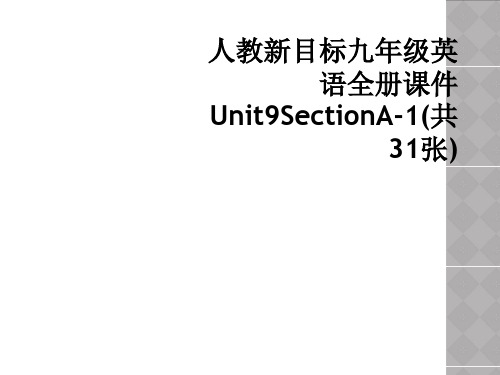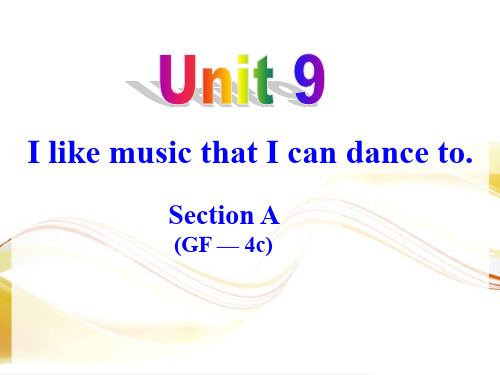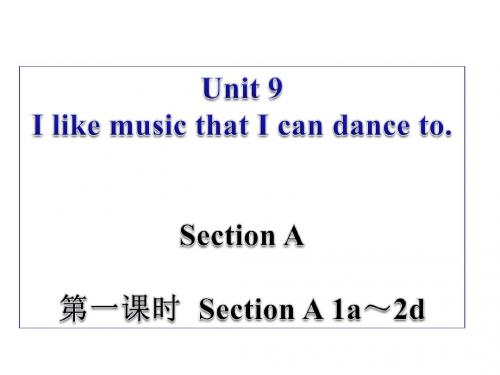新目标英语九年级公开课课件unit9 A
合集下载
人教新目标九年级英语全册课件Unit9SectionA1共31张

I prefer music that has great lyrics.
I love music that I can sing along with.
I like music that isn’t too loud.
light music
I like music that I can dance to.
I prefer ___a small gift __has some thought behind it rather than get some money.
A. to receive; what
B. receiving; what
C. to receive; that
D. receiving; who 解析:prefer to do sth. rather than do sth. 意为“宁愿做某事而不愿做某事 ”,第一个空填to receive 或 receiving ; 第 二 个 空 考 查 定 语 从 句 的 引 导 词 , 句 中 先 行 词 为 gift( 指 某 物 ) , 关 系 代 词 可 用 that 或 which。故选C。
along 3) _______ . What about you? What
that
with
A: I 4) _______ mupsriecfethrat 5) _______ great lyrics. And how about musicians?
B: Well, I love musicians 6) _______ play different kinds of music.
D. to watch TV; going out 解析:表示“喜欢做…而不喜欢做…”用prefer doing sth. to doing sth.,故选C。
新目标(Go for it)版九年级 Unit 9Section A-2 公开课一等奖课件

Lanm, we’re pretty relaxed about time. 在我们国家, 我们对时间相当宽松。 relaxed是形容词, 在这里意为“宽松的, 不加 以约束的”, 后面常接介词about。 My parents are relaxed about my clothes.
我的父母对我的服装不加约束。
relaxed还可以意为“放松的, 轻松自在的”。
You look very relaxed. Aren’t you busy now?
你看上去非常自在,难道你现在不忙吗?
链接:
relax v. 放松
relaxing adj. 使人放松的,令人感到轻松的
relaxation n. 当其意为“放松,消遣”时, 是不 可数名词;而当其意为“休闲活动”时, 是可 数名词。
(2012 抚顺英语中考) B --- Why do you look so _____. --- Because it’s rainy and I hate rainy days.
A. happy C. relaxed B. sad D. tired
relaxed (轻松的) about Teresa is pretty _______ time. She thinks it is OK if you arrive late. I felt ________ relaxed (relax) lying in the sun. What a good time! relaxing (relax) for We are thinking about _______ an hour.
3. Could your friends get mad if you’re even fifteen minutes late in Switzerland?
新目标九年级英语 Unit9 Section A(GF— 4c) 课件

3. The womawn hom/that they wanted to visit is a teacher.
4. The manw__h_o_se__ hair is white is his grandfather.
5. Is there a student _w_h_o_s_e____ father is a business man? 结论
6.Who drew the picturet_h_a_t_/_w_h_i_c_h__is worth 60,000 yuan? 7.The man__w_h_o_/_t_h_a_t__is wearing a sweater is a doctor. 8.This is a store_t_h_a_t_/_w_h_i_c_h_sells all kinds of clothes. 9.The woman__w_h_o_/_t_h_a_t_/_w_h_o_m__you talked to just now is from Japan. 10.The town_w_h_i_c_h_/_t_h_a_t____we visited last time is very beautiful.
5. She likes singers_w_h_o__s_in_g__th__e_w_o_r_d_s__c_le_a_r_ly_.
4c Make conversations about the kind of things you like and dislike.
What kind of food do you enjoy?
2、The car _w__h_ic_h__/_th_a_t___ my father bought last month is very beautiful.
4. The manw__h_o_se__ hair is white is his grandfather.
5. Is there a student _w_h_o_s_e____ father is a business man? 结论
6.Who drew the picturet_h_a_t_/_w_h_i_c_h__is worth 60,000 yuan? 7.The man__w_h_o_/_t_h_a_t__is wearing a sweater is a doctor. 8.This is a store_t_h_a_t_/_w_h_i_c_h_sells all kinds of clothes. 9.The woman__w_h_o_/_t_h_a_t_/_w_h_o_m__you talked to just now is from Japan. 10.The town_w_h_i_c_h_/_t_h_a_t____we visited last time is very beautiful.
5. She likes singers_w_h_o__s_in_g__th__e_w_o_r_d_s__c_le_a_r_ly_.
4c Make conversations about the kind of things you like and dislike.
What kind of food do you enjoy?
2、The car _w__h_ic_h__/_th_a_t___ my father bought last month is very beautiful.
Unit 9(Section A Grammar)九年级英语全一册(人教新目标Go For It!)

名词做定语
5.The ipad there is mine.
副词做定语
6.The boy to take the ball is my son. 不定式做定语
7.I have a friend called Bob.
分词做定语
8.He likes music that isn't too loud. 定语从句做定语
练一练
人 1. The boy _w__h_o__/t_h_a_t___ is playing ping-pong
is my classmate.
物 2. The e-mail _w__h_ic__h_/_th_a__t I received yesterday
was from my sister.
1
3
思维品质:学会谈论自己的喜好。 通过表达个人喜好,提高学生欣 赏美的水平。
文化意识:能对自己看过的书籍,
电影,听过的CD等进行简单的
描述,能运用本单元词汇和定语
从句表达自己的喜好类型和感受。
2
4
学习能力:本单元内容以“音乐
和电影”为话题展开,让学生讨论 自己喜欢的类型及自己的感受,进 而呈现了本单元的重点语言结构— 定语从句,要求学生能用本单元的 词汇和定语从句的功能谈论自己的 喜好。
Unit 9 I like music that I can dance to. Section A Grammar Focus
Language goals
语言能力:(1)进行一步复习巩固学
习Section A 部分所学的生词和词组。 (2)掌握如何表达自己喜好的句型。 (3)掌握that/which/who引导的定语从句的 用法。
2019年春人教新目标九年级英语Unit 9 教学课件(共46张PPT)

( A ) (3) — What do you think of the school uniforms?
— Very good. I like clothes _____ make me feel
comfortable.
A. that B. what C. who D. whose
3.Carmen likes musicians who play different kinds of music. 卡门喜欢能演奏不同类型音乐的音乐家。 who play different kinds of music 是一个定语从句,修 饰前面的名词(先行词) musicians。当先行词是人时, 定语从句的引导词要用 who 或 that。如果 who 在定语 从句中作主语,那么从句谓语动词的单复数形式要依 先行词而定。如: Many students like teachers who are friendly and fun. 许多学生喜欢友好又有趣的老师。 Do you know the girl who is wearing a red skirt over there? 你认识那边那个穿红裙子的女孩吗?
即学即练 ( A ) (1) I prefer _____ at home to ______ outside on such
a rainy evening.
A. staying; playing C. staying; play B. to play; stay D. to stay; playing
即学即练 用 kind of, a kind of 或 all kinds of 填空。 (1) Mum, can I have a cake? I am _________ kind of hungry. (2) Come and join our club. You can find __________ all kinds of activities in it. (3) Have you eaten ___________ a kind of fruit called olive? 2.I prefer music that has great lyrics. 我更喜欢歌词很棒的歌。 (1) prefer 更喜欢…… prefer to do … 更喜欢做…… 如:Many young people prefer cola to tea. 与茶相比,很多年轻人更喜欢可乐。 My father prefers to stay at home after a busy day. 忙碌一天后,我爸爸更愿意待在家。
2014人教版新目标九年级英语U9_I_like_music_that_I_can_dance_to_SectionA(2a-2d)

2c PAIRWORK Make conversations using the information in 2a and 2b.
About The Modern Xu Fei says 1. I prefer groups that play quiet and slow songs. 2. I love elctronic music that’s really loud About Dan Dervish 3. I like musicians who write their own songs. 4. I like musicians who play different kinds of music.
friends
活动探究
1. Carmen likes musicians who play different kinds of music. 2. Xu Fei likes the Australian singer Dan Dervish. 3. Carmen likes electronic music that’s loud. 4. Xu Fei prefers groups that play quiet and slow songs.
B:I like music that I can sing along with.
What about you? A:I prefer music that has great lyrics.
I like teachers that/who _______.
are strict with me/friendly to us… are humorous/kind/young has big eyes/curly hair…… can teach me patiently/allow us to use moble phones……
2014年版新目标英语九年级系列复习课件---Unit 9
• 5.Hmm, depends which movie. • 1) 本句省略了depends前的主语it和which movie后的从句部 分we’ll watch,这是典型的口语表达形式。在口语和非正式 场合,为保持语言简洁明了,交流者往往会省略彼此所知或 逻辑上可明确推断的内容。例如: • Anything I can do for you? • 我能为您做些什么吗?(省略句首部分Is there) • Please hand me one of those books; I don’t care which. • 请把那些书递给我一本,不管哪本都行。(省略句尾部分 you hand me) • 2) It depends (on) who/ what/ how/ whether…是一个常见句 型。当depend后接疑问词及含有疑问词的短语和从句时, 口语中会省略depend后的介词on,以求话语简练。例如: • It depends what day you catch me, and at what time of day. • 这取决于你哪天见我,以及见我的时间。 • Well, as for this matter, I can’t decide for now. Depends whether or not your dad will say yes. • 嗯,这件事我现在决定不了,取决于你老爸是否会同意。
• 7.While some people stick to only one kind of movies, I like to watch different kinds depending on how I feel that day. • stick v. 粘贴;将……刺入 (stuck, stuck) • e.g. He stuck a stamp on the envelope. 他把一 张邮票贴到信封上。 • stick to 坚持;固守 • e.g. Stick to your dream, you’ll suБайду номын сангаасceed with your hard work. • 坚持你的梦想,付出努力,你就会成功的。
九年级英语全册_Unit_9_When_was_it_invented全单元课件人教新目标版
b
e d
76___
1885___ 1927___
c
1971___
1976___
1a
Answer : the right order they were invented
5
2
4
1
3
Pairwork (1c:P68)
A: When was the _______ invented? B: I think it was invented in ______. 1971 1927 1876 1885 1976
in 1885 in 1876
in 1927
in 1971
in 1976
Edison invented the light bulb.
Who was the light bulb invented by?
The light bulb was invented by Edison.
Bell invented the telephone.
• • • •
such+名词/名词短语 so+形容词/副词 such (a/an)+ adj. +n. so + adj./adv.或so + adj.+ a/an +n.
• • • • • •
take place 发生;出现 in the 19th century 在19世纪 The popularity of…..的普及 without doubt 毫无疑问 at a low price 以低价 translate ….into …把……翻译成……
四、无被动语态的动词。
• 不及物动词及系动词 • happen • take place • die • rise • come true • come out eg.1. An accidenthappened (happen) just now. 2. I’m sure that my dream will come true. (come true) some day in the future
Unit 9 Section A 3a-3c 阅读课 九年级英语全一册课件(人教版新目标)
Feelings
feel much better again a good way to relax
Language points 我更喜欢能振奋到我的电影。 找出所有定语从句并翻译
不那么
得多
= upset = sad 单词:1. down adj.悲哀的;沮丧的
= conversation dialog n. 对话
粘贴;将……刺入 坚持;固守 悲哀;沮丧 对话;对白 (故事、电影等的)结尾;结局 纪录片 戏;剧 大量;众多 大量;充足 关闭;关上 关闭;停止运转 超级英雄 偶尔地;间或
What kinds of movies do you prefer? Why?
provide plenty of information.
短语:1. cheer sb. up 使某人振奋
2. have a happy ending有一个圆满的结局
2. try one’s best to do sth.尽某人最大努力做某事
3. solve one’s problem(s) 解决某人的问题 → answer the question回答问题
人教新目标版 九年级(全)
Unit 9 I like music that I can dance to.
Section A 3a-3c
阅读课
1.学习本课新词汇: stick, stick to, down, dialog, documentary, drama,
plenty, plenty of, shut, shut off, superhero, once in a while 掌握句型:
PraPcretsiecnetation
Pre-reading Look and say.
新目标英语九年级Unit 9 When was it invented?
5
2
4
1
3
ALICE: Life must have been different when you were a kid. WOMAN: Oh,not really.Why do you say that ? ALICE: Well,you didn' t have many modern inventions .Like you didn' t have a telephone ,right? WOMAN: Of course we did! How old do you think I am ?The telephone was invented in 1876. ALICE: How about cars ? I bet(打赌)cars weren' t invented yet . WOMAN: Sure, they were.Cars were invented in 1885.My family had a car .I think you need to take a history class,Alice. ALICE: Ha,ha! Well,did you have a TV? WOMAN: No ,we didn' t.The TV was invented around 1927,I think .Some friends of mine had one. But in those days,TVs were really expensive,and we couldn' t afford(买得起) one. ALICE: And I bet you didn' t have calculators and computers and stuff.That s something I do know.We learned in school that handheld(手持的) calculators were invented in 1971 and personal computers were invented in 1976. WOMAN: You are right. I didn' t have those things when I was young.But I do have now.
- 1、下载文档前请自行甄别文档内容的完整性,平台不提供额外的编辑、内容补充、找答案等附加服务。
- 2、"仅部分预览"的文档,不可在线预览部分如存在完整性等问题,可反馈申请退款(可完整预览的文档不适用该条件!)。
- 3、如文档侵犯您的权益,请联系客服反馈,我们会尽快为您处理(人工客服工作时间:9:00-18:30)。
主语 谓语动词的过去分词 宾语 时间状语
battery-operated 电池供电 slippers heated ice cream scoop shoes with adjustable heels
的拖鞋
加热的 冰激凌勺
可调节 后跟的鞋
Homework: Describe one of your inventions And then write it down.
Julie Thompson
changing the style of the shoes
Explanation:
•
be used for 被动语态, “被用来做……”。介词 for 表目的用途, 可接名词或动名词形式。
e.g. The woolen sweater is used for keeping warm. 毛衣是用来保暖的。
Chelsea Lanmon scooping really cold ice cream seeing in the dark
shoes with adjustable heels
batteryoperated slippers heated ice cream scoop
Jayce Coziar and Jamie Ellsworth
Section A
陈 清 涛 大五里中学
Museum
Invention Museum
Guessing:
What is it?
Guessing:
What is it?
Guessing:
What is it?
微波炉
Microwave oven It is used for cooking and heating food
Explanation: 1. annoying adj. 讨厌的, 恼人的 (往往 指事物) e.g. How annoying it is! 真讨厌。 annoyed adj. 生气的, 恼怒的 (往往 指人) e.g. My father is annoyed with me.
爸爸在生我气。
3b
A: What do you think is the most helpful invention? B: I think the most helpful invention is the light bulb. A: Why is that? B: Well, it gives people more time to work and play every day.
1876
1c
When was the telephone invented ? I think it was invented in 1876.
1885
1976
1971
Gang Dynasty
朝代
Who Chinese
Be used for Making copies
am (is, are) + done 一般现在时
一般过去时
The passive voice.
被动语态
主动语态变被动语态的结构图:
Bell invented the telephone in 1876.
主语 谓语动词过去时 宾语 时间状语
The telephone was invented by Bell in 1876.
care + ful → careful
The passive voice.
被动语态
英语中动词有主动语态和被动语态两种语态. 主动语 态表示主语是动作的执行者,被动语态表示主语是动作的 承受者, 在被动语态中动作的执行者有时用by短语表示 出来.
被动语态的构成:
Be + (及物动词的) 过去分词
{ was (were) + done
2a
Listen and number the inventions in the order that you hear.
3
1
2
2b Listen again. Match the inventions with their inventors and uses.
Invention
Who was it/ were What is it/ are they invented by? they used for?
(加热)
What food can be heated in it?
What is it used for?
calculator
It is used for counting.
What are they used for?
light bulbs
灯泡
They are used for giving light.
1b
a
Listen and match the inventions with the dates.
b
e d
1876 1885
c
1927
1971 1976
A: When was the car invented? B: It was invented in 1885.
1885
1976
1927
1971
Explanation: 2. helpful adj. 有帮助的, 有益的 e.g. Mr. White is a very helpful man. 构词法: n + ful → adj 再如: use + ful → useful thank + ful → thankful
beauty + ful → beautiful
battery-operated 电池供电 slippers heated ice cream scoop shoes with adjustable heels
的拖鞋
加热的 冰激凌勺
可调节 后跟的鞋
Homework: Describe one of your inventions And then write it down.
Julie Thompson
changing the style of the shoes
Explanation:
•
be used for 被动语态, “被用来做……”。介词 for 表目的用途, 可接名词或动名词形式。
e.g. The woolen sweater is used for keeping warm. 毛衣是用来保暖的。
Chelsea Lanmon scooping really cold ice cream seeing in the dark
shoes with adjustable heels
batteryoperated slippers heated ice cream scoop
Jayce Coziar and Jamie Ellsworth
Section A
陈 清 涛 大五里中学
Museum
Invention Museum
Guessing:
What is it?
Guessing:
What is it?
Guessing:
What is it?
微波炉
Microwave oven It is used for cooking and heating food
Explanation: 1. annoying adj. 讨厌的, 恼人的 (往往 指事物) e.g. How annoying it is! 真讨厌。 annoyed adj. 生气的, 恼怒的 (往往 指人) e.g. My father is annoyed with me.
爸爸在生我气。
3b
A: What do you think is the most helpful invention? B: I think the most helpful invention is the light bulb. A: Why is that? B: Well, it gives people more time to work and play every day.
1876
1c
When was the telephone invented ? I think it was invented in 1876.
1885
1976
1971
Gang Dynasty
朝代
Who Chinese
Be used for Making copies
am (is, are) + done 一般现在时
一般过去时
The passive voice.
被动语态
主动语态变被动语态的结构图:
Bell invented the telephone in 1876.
主语 谓语动词过去时 宾语 时间状语
The telephone was invented by Bell in 1876.
care + ful → careful
The passive voice.
被动语态
英语中动词有主动语态和被动语态两种语态. 主动语 态表示主语是动作的执行者,被动语态表示主语是动作的 承受者, 在被动语态中动作的执行者有时用by短语表示 出来.
被动语态的构成:
Be + (及物动词的) 过去分词
{ was (were) + done
2a
Listen and number the inventions in the order that you hear.
3
1
2
2b Listen again. Match the inventions with their inventors and uses.
Invention
Who was it/ were What is it/ are they invented by? they used for?
(加热)
What food can be heated in it?
What is it used for?
calculator
It is used for counting.
What are they used for?
light bulbs
灯泡
They are used for giving light.
1b
a
Listen and match the inventions with the dates.
b
e d
1876 1885
c
1927
1971 1976
A: When was the car invented? B: It was invented in 1885.
1885
1976
1927
1971
Explanation: 2. helpful adj. 有帮助的, 有益的 e.g. Mr. White is a very helpful man. 构词法: n + ful → adj 再如: use + ful → useful thank + ful → thankful
beauty + ful → beautiful
